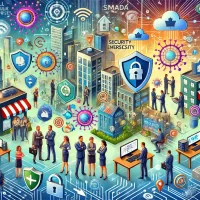The COVID-19 pandemic disrupted many economies, changing operation structures for organizations around the globe. While some businesses were put out of existence, the lucky ones were forced to adopt remote working and adhere to social distancing measures.
Even though the return of many remote employees back to the office is viewed as a positive move, it also poses serious cybersecurity threats to organizations. Companies face three main threats welcoming their remote workers back to the office.
Cyber Criminals on the Prowl
2020 saw record-breaking statistics on the number of cyberattacks on governments, companies, and individuals. This, coupled with the level of sophistication that cybercrime perpetrators have adopted, raises concerns for companies reopening their offices. Top on the list is any malware that remote workers may have been exposed to that can be transferred to office networks.
Additionally, cybercriminals lying dormant on devices belonging to remote employees can access office networks once they return to work. These cybersecurity risks can easily escalate into serious issues, including data theft and ransomware attacks currently popular among cybercriminals.
Increased Number of Breaches on Cloud Services
The rapid adoption of remote work compelled many companies to seek cloud-based services and infrastructure. More companies are expected to move their workload to the cloud to cut costs and scale their operations.
Despite the economic sense and rationale behind migrating to the cloud, cloud systems have become prime targets for cyberattackers. Many companies were victims of data breaches that cost millions of dollars during the pandemic period. Cybersecurity specialists attribute these to misconfigured cloud settings that left companies vulnerable to cloud-based cyberattacks.
COVID-19 Related Phishing Attacks
The continued updates on COVID-19 vaccines and related information is yet another camouflaged threat to companies that are reopening their offices to their remote workforce. Many cybercriminals are targeting unsuspecting employees seeking information on COVID-19 vaccinations. Although pharmaceutical and medical distribution companies have been more susceptible to such attacks, any company can fall prey to these attacks. A common tactic being used is phishing attacks disguised as vaccination appointment emails.
These three cybersecurity looming threats can endanger the data and operations of both small and big companies. Unfortunately, most remote workers reporting back to the office remain unaware of cybersecurity risks, and the companies that they work for are ill-prepared for cyberattacks. These make them easy targets for cybercriminals and extortionists.
All hope is not lost because most of today’s cybersecurity threats need human activation to work. Companies can therefore indemnify themselves by raising awareness of looming threats and training their employees on how to identify and handle potential attacks. When combined with strong technology solutions, cybersecurity training can enable employees to detect unusual activity early enough and mitigate cyberattacks against their companies.
Click here to view original web page at goodmenproject.com








